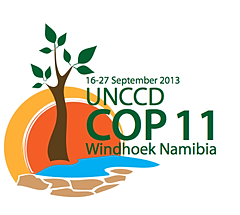16-27 September 2013. Windhoek, Namibia. Conference of the Parties (COP-11) to the United Nations Convention to Combat Desertification (UNCCD).
Over 3 000 international delegates, including 45 ministerial participants were in attendance during the two-week conference.
Over 3 000 international delegates, including 45 ministerial participants were in attendance during the two-week conference.
Developed as a result of the Rio Summit, the United Nations Convention to Combat Desertification (UNCCD) is a unique instrument that has brought attention to land degradation to some of the most vulnerable ecosystems and people in the world. Fifteen years after coming into force, the UNCCD is increasingly recognized as an instrument which can make an important contribution to the achievement of sustainable development and poverty reduction.
The CSO's also want to be given a much bigger role in the decision making of the UNCCD as they feel they are more connected with the farmers on grass-roots level.
Another de-facto is the level of communication between the media and the affected farmers. Lets face it, the COP11 does not necessarily concern the average citizen except that the country will benefit immensely from such a conference in terms of exposure and monetary benefit. Also, the terms land degradation and desertification are new concepts to many Namibians. Mention drought and the average farmer will be able to tell you what it is. The average person is really not interested in this conference so covering the COP11 in local newspapers and on television is not as major as it would have been broadcasted on indigenous radio stations. It is a fact that people who are more keen on finding out about the decisions taken at this conference are the very same farmers who in most cases do not own a television set, let alone read the newspapers. The media should have conducted regular radio shows to inform the affected people, who are kilometres away, of what is happening at the conference.
Opinion:
Civil Society Organisations (CSO's) held a peaceful demonstration on the premises and protested against the presence of agribusiness at the COP11. Agribusinesses are accused of promoting pesticides that destroy crucial micro-organisms that affect the nutrient cycle in the soil, prevent natural re-generation of the soil, resulting in continuous land degradation.The CSO's also want to be given a much bigger role in the decision making of the UNCCD as they feel they are more connected with the farmers on grass-roots level.
Another de-facto is the level of communication between the media and the affected farmers. Lets face it, the COP11 does not necessarily concern the average citizen except that the country will benefit immensely from such a conference in terms of exposure and monetary benefit. Also, the terms land degradation and desertification are new concepts to many Namibians. Mention drought and the average farmer will be able to tell you what it is. The average person is really not interested in this conference so covering the COP11 in local newspapers and on television is not as major as it would have been broadcasted on indigenous radio stations. It is a fact that people who are more keen on finding out about the decisions taken at this conference are the very same farmers who in most cases do not own a television set, let alone read the newspapers. The media should have conducted regular radio shows to inform the affected people, who are kilometres away, of what is happening at the conference.


No comments:
Post a Comment